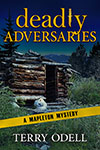Significant Events
Terry Odell
 Significant events can be individual, familial, national, or international.
Significant events can be individual, familial, national, or international.
I was at a family reunion last weekend, and seeing so many cousins in one place was a visual lesson in the strength of DNA. No problem knowing we were all related. What was missing was the generation that included some we fondly remember as the crazy old aunts. Looking around, the cousins of my generation realized that to a lot of the others in the room, we were now the old guard and undoubtedly would be thought of as the crazy old cousins.
Many of the maternal side of my family hailed from Danzig (now Gdansk), and were lucky enough that one of the crazy old aunts had the foresight to push the family into selling their goods and getting the hell out of there. Their arrival in New York was on the maiden voyage of the SS Noordam. A reporter was sent to cover the arrival of the ship, and when they saw the passenger manifest with Anker after Anker, they figured there was a story there.
Another branch of the family lived in Berlin, and their patriarch was of the “This too will pass” mindset. Kristallnacht, November 9-10, 1938, opened his eyes, and they began their plans to leave. That’s a significant historical event that might be more significant to their family than others.

Image by Foundry Co from Pixabay
For most of us who are old enough to remember, September 11th, 2001 is a date that won’t be forgotten. We remember where we were, what we were doing, when we heard the news.
I was home, working on my part-time day job, which was entering registration data for an upcoming conference. As was typical, most of the attendees waited until the day before the early bird pricing was going to expire, and I was swamped. My husband called, said a plane crashed into the twin towers. My first reaction was, that’s a terrible accident, but I’m busy. He said to turn on the television, which was in his office in the next room. I did, and it took a moment or two to register that it wasn’t an accident at all. I turned up the volume, went back to my data entry, but turned on the ‘real’ television in the living room and bounced back and forth between work and watching for updates.
 There are other major historic milestones. Another for me was the assassination of JFK. I was in high school history class, which was being taught by a ‘student teacher.’ I don’t know what they’re called in other regions, but this was part of the required curriculum for anyone wanting a teaching certificate in Los Angeles, and it was late enough in the semester that the teacher himself felt he could leave the room and leave her in charge. I don’t remember their names, but I remember he came into the room and interrupted the lesson and announced the assassination. Everyone’s first reaction was that he was playing up the curse that presidents elected in years with zeroes would come to a bad end. Then we noticed he was crying, and the shock hit us. School was dismissed for the day.
There are other major historic milestones. Another for me was the assassination of JFK. I was in high school history class, which was being taught by a ‘student teacher.’ I don’t know what they’re called in other regions, but this was part of the required curriculum for anyone wanting a teaching certificate in Los Angeles, and it was late enough in the semester that the teacher himself felt he could leave the room and leave her in charge. I don’t remember their names, but I remember he came into the room and interrupted the lesson and announced the assassination. Everyone’s first reaction was that he was playing up the curse that presidents elected in years with zeroes would come to a bad end. Then we noticed he was crying, and the shock hit us. School was dismissed for the day.
Few of us still remember Pearl Harbor Day, but that was another one where people knew what they were doing when they got the news.
Today, we should take a moment to remember 9-11 and those who lost their lives, and the repercussions throughout the world.
How do you handle historical and significant events in your writing? If your characters are boarding a plane, do you consider the security hoops they have to deal with? Do they even know what it was like before the inspections were put in place? Do you include mention of the pandemic? I read books obviously written during the pandemic by authors who assumed it would be long gone before their books came out, and they got it wrong. Or elections? Do you mention current administrations? The floor is yours.
How can he solve crimes if he’s not allowed to investigate?
 Gordon Hepler, Mapleton’s Chief of Police, has his hands full. A murder, followed by several assaults. Are they related to the expansion of the community center? Or could it be the upcoming election? Gordon and mayor wannabe Nelson Manning have never seen eye to eye. Gordon’s frustrations build as the crimes cover numerous jurisdictions, effectively tying his hands. Available now in ebook, paperback, and audio.
Gordon Hepler, Mapleton’s Chief of Police, has his hands full. A murder, followed by several assaults. Are they related to the expansion of the community center? Or could it be the upcoming election? Gordon and mayor wannabe Nelson Manning have never seen eye to eye. Gordon’s frustrations build as the crimes cover numerous jurisdictions, effectively tying his hands. Available now in ebook, paperback, and audio.
 Like bang for your buck? I have a new Mapleton Bundle. Books 4, 5, and 6 for one low price.
Like bang for your buck? I have a new Mapleton Bundle. Books 4, 5, and 6 for one low price.
New! Find me at Substack with Writings and Wanderings
 Terry Odell is an award-winning author of Mystery and Romantic Suspense, although she prefers to think of them all as “Mysteries with Relationships.”
Terry Odell is an award-winning author of Mystery and Romantic Suspense, although she prefers to think of them all as “Mysteries with Relationships.”




